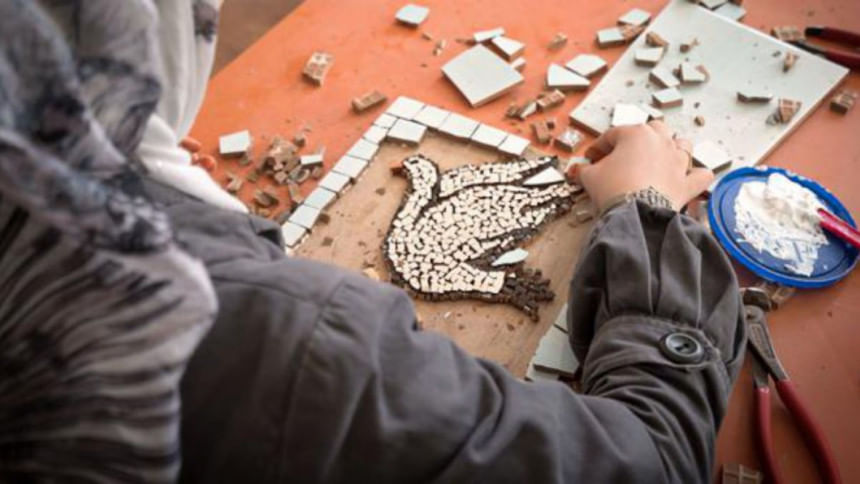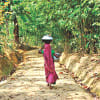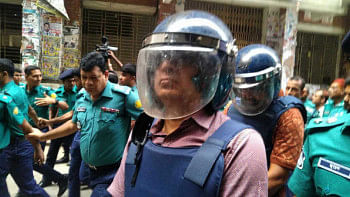The unseen link between sexual violence and economic development

This year's Independence Day has come with a new sense of pride and the hope of a promising future. Our country's move from low-income country (LIC) status to lower-middle-income country (LMIC), as per the World Bank's classification, has created hopes that Bangladesh's economic development will go a long way in the upcoming years. But I often find myself eyeing the future with dwindling optimism, especially with the recent rise in the number of rapes of women and children in this country that we get to know about from the media. We all seem to understand, even if we are seldom able to empathise with, the psychological burden and social cost of such incidents for the victims.
But what is not taken into consideration is that violence against women, women's economic empowerment and a country's economic progress are all weaved together in one thread. I think most Bangladeshi citizens seldom think about incidents of rape until the next horrific incident comes up in the media. What we are really concerned about is the increase in our income or the growth in our GDP or other such economic developments. But it is for this very reason that we must all stand together against all forms of sexual violence against women.
Remember the horrific news of the rape and murder of Rupa, an aspiring law student? The first time I read about her, I was overwhelmed with emotion for a woman I had never met. I too had taken the same route countless times for my work, the one that Rupa had taken for her Teachers' training examination. This young woman surely embodied the values and virtues of the women of her generation, those who want to be independent, explore opportunities in life, and also have a family. A person like Rupa could have been a role model for many other girls/boys and also would have been a contributing individual in Bangladesh's economy. Instead, what we are left with is five accused criminals and the potential cost to be incurred by the state for their lifelong imprisonment. And, what we will probably not know is the consequence of this deplorable crime in the form of thousands of Bangladeshi girls being restricted from travelling alone by concerned parents or guardians.
A report published by the World Economic Forum (WEF) in 2017 highlighted that Bangladesh has diminished gender gaps in the area of political empowerment in comparison to its South Asian counterparts, whereas gender gaps in economic empowerment offer a bleak scenario. How then does a country solidify its status as LMIC with a large share of its population lagging behind in terms of economic empowerment? The issue of economic empowerment for a person is inherently associated with his/her skills, since they create opportunities for employment. Then again, how can a country have skilled female citizens if women do not feel safe going out of their homes or their family does not support or approve of their choices? In fact, if they are not professionally skilled, how will they be economically empowered?
You don't even have to necessarily take a macro-outlook on this. Just look around yourself, if you have come across strong, independent and professionally successful Bangladeshi women, usually they are from families that support them or they have a good foothold in society. The ones I have come across have awed me with their brilliance. What I have noticed is that they had at least one area of support where the gender gap was limited. This included family or educational institution or workplace or student or professional groups they belonged to. These institutions not only created an enabling environment for these women to access opportunities in life, but also allowed them to go beyond the stereotypical gender role dictated by society. Then again, such progressive institutions are still far from being a norm in Bangladesh. And, this raises the question of leaving behind self-motivated Bangladeshi females, who would like to access opportunities, but are constrained by the lack of safe physical mobility.
If you are still not convinced that Bangladesh's economic progress will largely depend on ensuring women's safety, you should make yourself aware of the unforeseeable far-reaching consequences women's economic empowerment can have. A substantial amount of research has already shown that women's economic empowerment not only benefits the women concerned, but also have a range of growth-enhancing effects. These could include higher savings as women and men differ in their savings behaviour (Seguino and Floro 2003), more productive investments, use and repayment of credit (Stotsky 2006), and higher investments in the health and education of their children, thus promoting human capital of the next generation and therefore economic growth (Thomas 1997, World Bank 2001).
Whereas, thanks to the recent rise in rape and other forms of sexual violence, we may face an opposite scenario in the years to come, since families from low- and middle-income households, concerned about their daughters' safety and well-being, will marry them off at a tender age. Globally, the youngest first-time mothers are more common in countries such as Chad, Bangladesh and Niger. A recent study by UNICEF indicated that child marriage is currently on an increasing trend in Bangladesh and roughly stands at 59 percent. This phenomenon also may imply that adolescent girls, before they can go on to develop their own economic security and empowerment, will give birth to children.
Therefore, if we are aiming to make our country richer in terms of wealth and quality of life, we have to recognise the unseen cost of rape on Bangladesh's economic development. It is crucial to understand that the perpetrators of sexual violence are also inhibiting our country's economic growth. Is this not enough to break your silence?
Jannat Adib Chowdhury is a development practitioner and currently works for Swisscontact in Bangladesh. Views expressed in this article are those of the author and do not necessarily reflect the views of the author's organisation.










Comments